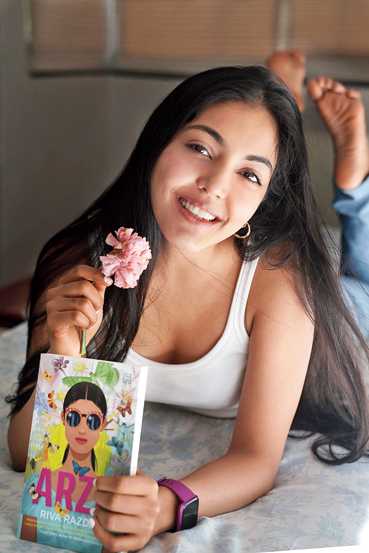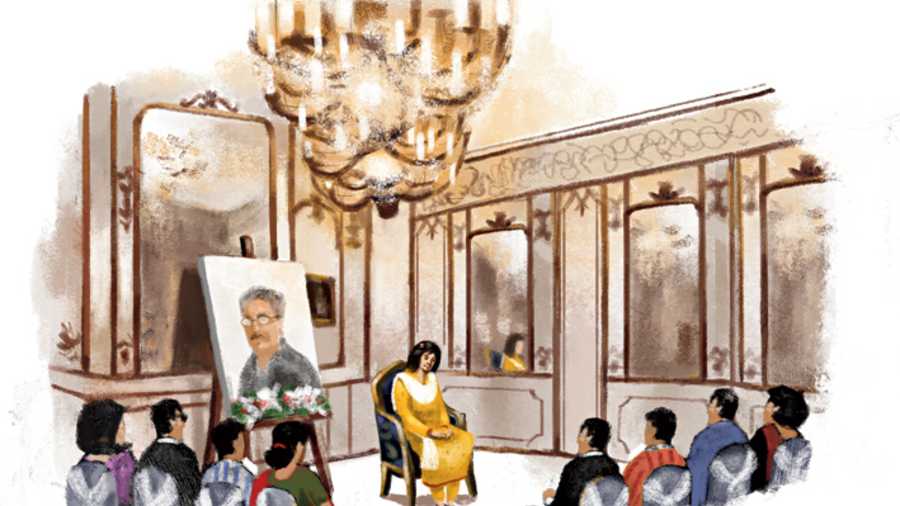Outside the baroque room there were whispers of how distasteful the party was. The uninvited hungrily watched the Instagram stories of Raahi Pandit’s guests being greeted by waiters dressed in angrakhas who bade ‘Salaam’ to the newly arrived and handed them a goblet of something potent as ghazal singers softly crooned in the background. Then the hostess herself appeared, dressed as a dowager queen in gold. Everyone on the other end of the screen gasped at the impropriety of her festive get-up just one week after Maahir Kumar’s death! But before her audience at home could properly start tearing apart her regal silk suit and the large gold nath supported by a delicate ruby-studded sahara strung in her hair — still lustrously black, even at 60! The whores have all the luck! — the image disappeared.
The phone of every guest was snatched away and deposited in lockers. Raahi Pandit had only one rule ever since she retired from Bollywood: No more watching.
Once satisfied that her carefully constructed Mughal court in Mayfair was safe from unfriendly eyes, Raahi swept her long black hair, the object of so much envy from Mumbai to London, behind her back and took her rightful place at centre stage. The chandelier above her was lit and a soft glow bathed the large portrait of her dear husband like a halo.
“Welcome,” she began, “I’m honoured to have you all here tonight, at this celebration of Maahir’s life. You have been loyal friends to us for the last 34 years and I thank you for being present here on the occasion of his demise, to honour him and bid him farewell in the way he wanted. With a party not a funeral.”
A few glances were exchanged here. The guests were Raahi’s friends, of course. But everyone knew that a funeral had been held back in India. One that neither Raahi nor her daughters had been invited to.
Seher, her eldest, always aware of what people were saying about her mother, immediately caught the snarkily raised eyebrows on the faces of the two fashion designers right next to her. She swallowed the acid that sprung to her tongue and focused on her mother, who had begun outlining her history with Maahir Kumar the movie star. Her father. Seher bit her lip, nervous now. She hoped that her mother would skip past the less pleasant truths. But she knew that she hoped in vain. Her mother would never drain a performance of its passion, even if it meant compromising her own reputation.
Raahi had been an actress herself in the 80s — known for her bee-stung mouth, her creamy Kashmiri skin and her audacity to show said skin in a pink bikini, both in the movies, and at Sun and Sand hotel in Bombay every Sunday. And it was here that the young daughter of Kashmiri refugees, only one-and-a-half film old, caught the eye of the much-married and much older movie star Maahir Kumar.
“I’ll never forget,” Raahi said, laughing with tears in her eyes, “how he strode up to me while I was coming out of the pool, with a blue-and-white striped towel in his outstretched hand to wrap around my candy-striped bikini.”
Raahi winked and her audience chuckled appreciatively. Seher smiled despite herself. Her mother always did know how to play the audience.
“I smiled and made smart-alecky conversation and pretended not to be overwhelmed by his strapping appearance and take-charge demeanour. But, in a few minutes, when he pronounced, ‘You will do your next film with me’, I was shocked speechless. My jaw was actually hanging open... and I was nodding. Without even a full conversation with the man or any time to think about my dates and the commitments I had already made… I accepted. Even though I knew it would get me into a lot of trouble with two major producers and one major movie star.”
“Why did I accept? Because I already knew. Maahir would be the love of my life. He would be my entire future. It was a completely unfounded belief. But it was the strongest, most potent thing I’d ever felt. And whatever that feeling was... I’m glad I listened to it.”
From then on, they did every film together, setting the theatres and the headlines on fire. The on-screen chemistry between the roguish blue-eyed Pathan and the petite but fiery Raahi was incredible. Audiences flocked to the theatres to watch them say the most cliched dialogues to each other. After a point, it didn’t matter what they were saying, so long as they were together, within reaching distance of each other. It transported the viewer into the reaching distance of something too. Some unrealised but dormant ideal of beauty and love that lay burrowed in their souls. The fact that they didn’t belong to each other in reality made it all even more romantic.
That was exactly how Raahi felt. It didn’t matter to her at 17 or 18 or 19 that Maahir was a married man with a wife and a son waiting at home. He was hers. Anyone with a ticket to New Talkies or Regal could see that. She could see that. It didn’t matter what her parents thought or what certain moralists claimed in the more puritanical papers. They were adults and they were fantastically in love.
“Of course, it began to matter when I became pregnant in 1991,’ Raahi said. “And then again in 1999. It became imperative that I have some kind of formalisation of my relationship with Maahir. My eldest, Seher, had been ostracised enough in school for being a bastard child. I didn’t want Zaara to face a similar criticism.”
Here Raahi paused and looked at her beautiful daughters, one of whom was cringing with embarrassment, the other, next to her was crying in silent rapture. Zaara couldn’t help it. Unlike her elder sister, she thought Ma and Baba’s story the most magical in the world.
“But then Maahir, who doted upon us, argued, correctly, that we didn’t need to be confined by the narrow-minded thinking of our neighbours in India. So, he bought me my beautiful house in Mayfair and we sent the girls to Seven Oaks for their schooling. And just look how wonderfully they’ve turned out.”
The audience turned to take in Seher and Zaara and nod appreciatively. Seher wilted under their gaze, her tall figure hunching immediately, turning inwards while Zaara, the smaller of the two, bloomed and grew taller, her pink cheeks flushing further with pride at having some role to play in this great saga of Maahir and Raahi’s.
“Maahir spent the majority of his year here with us, returning to India only for... Diwali holidays or if our studio really ruined a film in his absence. Which rarely happened. How could it? He ran every script by me! We watched every new director and actor’s reel together. By making me a prominent part of Kumar Studios, he made me a partner in every sense that he could.”
Here, Seher, who had quietly walked to Raahi during her speech, put a gently restraining hand on her shoulder. The eulogy was turning into a testimony and their guests were starting to look uncomfortable. Always quick at taking direction, Raahi immediately broke off with a smile.
“Oh well,” she said charmingly, blinking back tears, “What matters is that Maahir Kumar was a good, a great man who enriched our lives with his presence and continues to take care of us from his grave.” Raahi then took a steadying breath and Seher’s hand in her own.
“To Maahir Kumar,” she looked her audience in the eye. “Superstar. Producer. The father of my children and my loving husband.”
Raahi raised her goblet to her audience almost as a challenge. Two hundred were instantly raised in response.
“May you rest in peace my love.”
“May you rest in peace,” they answered.
Raahi smiled and drank deeply as tears ran freely down her face now. Only Seher caught the glint in her eye. Of satisfaction. Of acceptance. After all these years of being ‘the other woman’, Raahi was finally being recognised as Maahir’s wife. His real love.
Even if the moment was short-lived and orchestrated.
(To be continued)

Riva Razdan is a New York University graduate and currently working as a screenwriter and author based in Mumbai. Her debut novel Arzu was published by Hachette India in 2021
This is the first episode of Riva Razdan’s serialised novel Nonsense and Respectability. It will be published every Sunday











